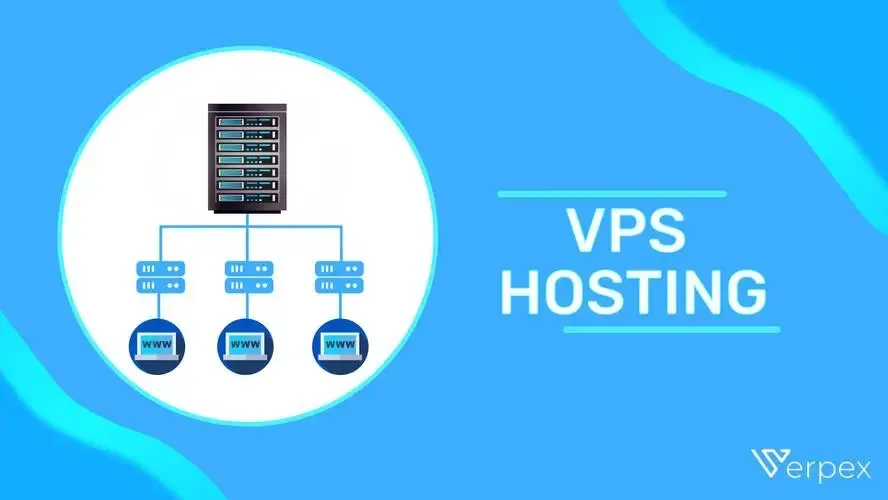A Virtual Private Server (VPS) provides a private space on a shared server, offering more control and resources than basic hosting.
This guide covers how a VPS works, its benefits and drawbacks.
We’ll also explain how to migrate to a VPS and answer common questions to help you decide if it’s the right choice for your website.
What is VPS Hosting?
VPS stands for virtual private server. It’s a type of web hosting in which you share server space with other websites, but the server will be partitioned off into your own private environment.
Essentially you'll get plenty of processing power and can handle high daily traffic.
For medium-sized businesses needing better performance, more storage, bandwidth and control, the right VPS hosting ensures your website runs at its best.
How Does VPS Hosting Work?
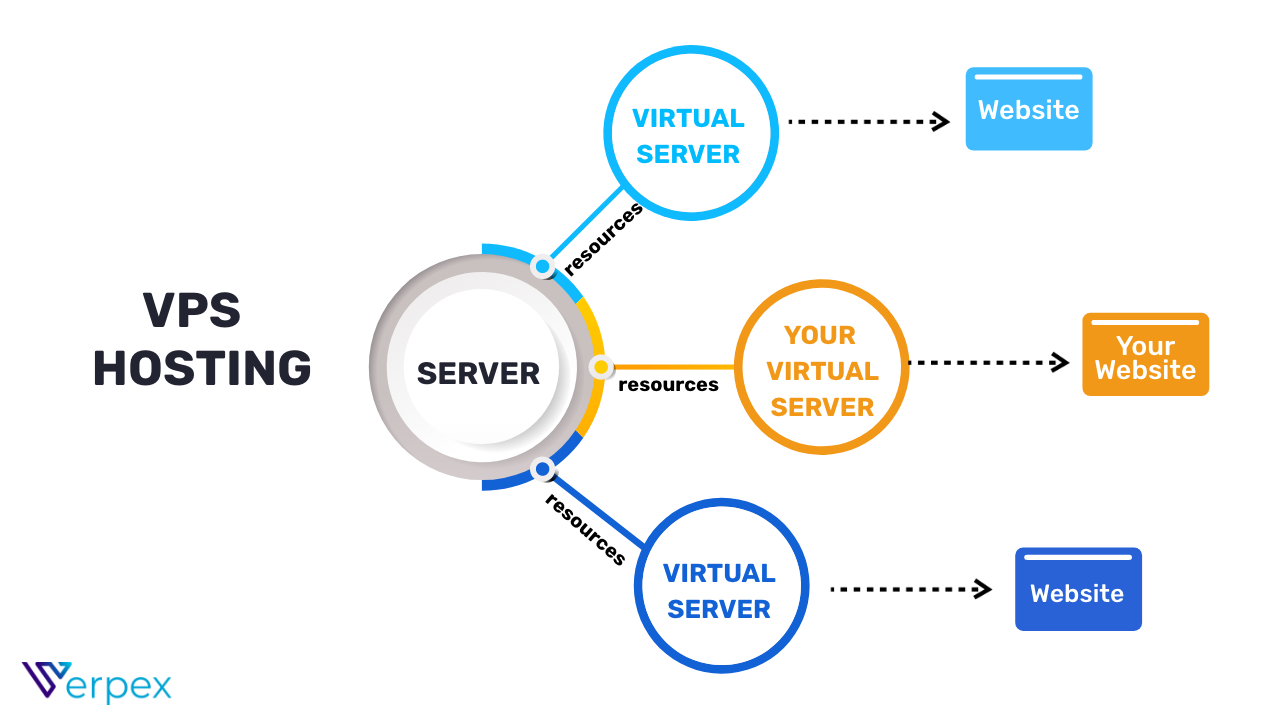
VPS works like a hybrid between shared and dedicated hosting.
Although you’ll be sharing a server with multiple other websites, your website will actually be cordoned off in a private portion of the server.
Here’s a breakdown of how it works:
Splitting a Physical Server
A physical server is divided into multiple virtual compartments using software called a hypervisor.
Each of these virtual servers is called a Virtual Private Server (VPS) and operates independently.
Dedicated Resources for Each VPS
- Your VPS comes with its own allocated CPU power, memory (RAM), and storage space. These resources are exclusively yours and are not shared with others, ensuring reliable performance.
Choose Your Operating System
You have the freedom to install your preferred operating system (like Linux or Windows) on your VPS.
This allows you to customize and configure the server environment to suit your specific needs.
Isolation from Others
- Even though multiple VPSs are on the same physical server, they are isolated from each other. Problems like security breaches or high traffic on another VPS do not impact your VPS.
Full Control Over Your Server
You get administrative access (root access on Linux or admin access on Windows) to your VPS.
This means you can install any software and make advanced configurations as needed.
Who Should Consider VPS Hosting?

Great for Medium-sized businesses
VPS is a significant step up in terms of storage space and bandwidth, making it ideal for medium-sized and growing businesses

Those looking for more control
VPS hosting expands what you’re able to do with your servers. This includes installing software and systems, making it a good choice for experienced web developers

Users that need a speed boost
If you’ve noticed your shared hosting website start to lag, it might be time for an upgrade to VPS for a significant boost in performance and speed

Advanced Developers
VPS hosting lets you customize server settings and install specialized software. It's perfect for developers needing a tailored environment for their applications.

Businesses Planning to Scale
If you expect growth, VPS hosting lets you easily upgrade resources like CPU, RAM, and storage. This ensures your hosting can scale with your business smoothly.
Advantages and Disadvantages of VPS Hosting
Pros
Cons
Unpacking the Advantages of VPS Hosting
1. Full customization options
VPS hosting gives you full control to customize your site—you can install your own software and custom systems you've developed.
If this sounds too technical, you can choose managed VPS hosting, where all the technical details are handled for you.
2. Affordable
VPS hosting strikes a nice balance between processing power and affordability.
It’s not nearly as expensive as dedicated hosting but represents a significant step up from shared hosting plans
3. Top notch security
In addition to data center security like SSL certificates, firewalls, and antimalware, you can add your own security measures.
Plus, with your site in a separate environment, you're protected from cyber-attacks affecting other users on the server.
4. Good reliability
Because you don't share bandwidth with others, you get increased reliability and uptime.
You’d typically only experience performance issues if you exceed your bandwidth limits or have chosen an unreliable host.
5. Impressive speeds
With VPS hosting, you rarely experience slow-downs.
Most packages offer generous bandwidth, and because your server is private, you'll enjoy consistently strong performance.
6. Managed options are available
If you need significant processing power but lack the technical skills to configure servers yourself, you can choose a managed service.
The hosting provider will handle all the technical aspects while you enjoy the benefits
7. Good traffic handling
Most VPS packages are set up to handle quite large amounts of traffic. If you’re expecting a spike in traffic you can speak to the customer service team to upgrade fairly easily too.
Downsides of VPS Hosting to Consider
Hardware limitations
Your VPS plan includes a fixed amount of bandwidth and processing power, and you might experience slowdowns if you exceed these limits.
While it's fairly easy to scale up VPS hosting, it's not as flexible as cloud servers and requires some planning.
Requires some technical knowledge
Unless you opt for a managed service, you’re going to need some advanced technical knowledge to get the most out of your servers
Increased responsibility
With VPS hosting, you're responsible for more daily administration and management tasks, so if something goes wrong, you'll need to fix it yourself.
You can avoid this by choosing a fully managed service where the host handles everything for you.
Signs You Need to Move to VPS Hosting
Your website is lagging
If your website on a shared hosting plan is experiencing significant slow-downs, you may have exceeded your bandwidth. Switching to VPS hosting can boost your performance.


You want more control
If you have web development experience, VPS hosting lets you explore customization options.
Affordability
Some users on dedicated hosting find it’s too much for their needs. Making a switch down to VPS hosting is much more affordable in the long run.


Need for enhanced security
If you're dealing with sensitive data and require stronger security measures, VPS hosting offers better protection than shared hosting.
Migrating to VPS: What to Expect During the Transition
Transitioning from shared hosting to VPS can be a smooth process if you know what to expect.
Here's a breakdown of key steps and considerations during the migration:
1. Backup Your Data
Before migrating, make sure to back up all your website files, databases, and important information to prevent data loss.
2. Choose the Right VPS Plan
Assess your resource needs (CPU, RAM, storage) and select a VPS plan that fits your website’s current and future traffic.
3. Server Configuration
You’ll need to configure your new VPS environment, including setting up your operating system, control panel, and security settings.
4. Data Migration
Transfer your website files, databases, and email accounts from the old server to your new VPS. Many hosting providers offer migration tools to simplify this process.
5. DNS Propagation
After moving your data, update your domain’s DNS settings to point to the new VPS. It may take up to 48 hours for DNS propagation to complete.
6. Testing the Website
Test your website on the new VPS to ensure everything is running smoothly. Check for issues with speed, performance, and any broken features.
7. Monitor Performance
Once your site is live on the VPS, monitor its performance to identify any potential issues with resource usage or loading times.
Types of VPS Hosting
Windows VPS
Windows is the world's most popular operating system, so Windows VPS solutions are common.
They provide a private virtual environment where you control all server resources and can install any software compatible with Windows.
Linux VPS
Although Linux is often seen as a niche operating system, many VPS-hosted sites use it because running a LAMP stack offers great customization.
Linux VPS is cheaper than Windows VPS, but you won't be able to run Windows applications at the same time.
Cloud VPS
Here your website is hosted in a hybrid environment that combines VPS and cloud solutions.
While resources are shared across multiple servers, you still have root access and administrative rights to your assigned portion.
Any traffic spikes or strain on resources can be spread across multiple servers.
This option is usually more expensive than standard VPS packages but offers more flexibility.
Multi VPS
Multi VPS allows you to access multiple servers at the same time.
It's a good option for those that have multiple websites in different niches.
This allows you to customize each server specifically and run different operating systems on each one.
Managed VPS Vs. Unmanaged VPS
| Aspect | Managed VPS | Unmanaged VPS |
|---|---|---|
| Complexity | Hosting provider handles all technical tasks, relieving you of server management duties. | Requires technical expertise to configure and manage the server yourself. |
| Cost | Slightly more expensive but includes 24/7 expert support and maintenance. | Less expensive, but minimal support from the hosting provider. |
| Server Backups | Backups are fully managed and typically performed hourly or daily by the host. | You are responsible for setting up and managing your own backups and restores. |
| Security Support | Host ensures servers are patched and updated with the latest cybersecurity defenses. | You need to proactively manage security updates and patches yourself. |
| Customization | Customization options are limited as the host manages most settings. | Offers significant freedom to tweak and customize server configurations. |
Considerations for Choosing a VPS Host
Reputation: It’s vital your host has a good reputation and is known for good customer service. Make sure to do some research prior to signing up and check out online reviews.
Uptime guarantee: If a data host can’t guarantee a minimum of at least 99.99% uptime, then don’t even think of using them. This is now the industry standard
24/7 support: Problems can occur at any time of the day or night, which is why it’s important to find a host that can fix any problems 24/7.
Traffic location: The further your servers are from your customers, the slower your website will be. Make sure your host has data centers in the regions you operate in.
Cost: There’s a huge range of different prices these days so it’s important to set a budget before you start your search. This should be based on the expected traffic for your website.
Data Storage: This will determine how much information you can pack into your site. Make sure you choose a host that can accommodate your business needs.
Processing power: Check how many CPU cores and how much processing power each hosting package offers; this will determine your site's speed. Compare different tiers to see how they differ.
Service Level Agreements: These outline how quickly the host resolves any issues you might have. Major incidents should be fixed within a few hours, so check the timeframes offered.
Security controls: Choose hosts that offer free security features as standard, including an SSL certificate and a strong firewall. Avoid hosts that don't provide these tools.
VPS Hosting on Cloud Infrastructure - Traditional Infrastructure Vs. Cloud VPS
As technology evolves, more hybrid options are becoming available. One popular choice is combining VPS with cloud hosting, where virtual sites are hosted across multiple servers.
Cloud VPS offers the benefit of accessing a larger pool of resources for easier scaling, while still keeping your environment fully isolated.
Although it's more expensive than traditional VPS, it provides greater flexibility.
Whether on a private or public platform, cloud servers can give your business a competitive advantage by offering scalability that grows with your needs.
This is especially true when using advanced, built-in tools offered by cloud applications.
| Aspect | Traditional VPS Hosting | Cloud VPS Hosting |
|---|---|---|
| Infrastructure | Single physical server | Multiple servers (cloud infrastructure) |
| Resources | Fixed, limited resources | Flexible, scalable resources |
| Environment | Fully isolated | Fully isolated |
| Flexibility | Less flexible | More flexible and adaptable |
| Cost | Generally cheaper | Slightly more expensive |
| Platform | Private servers | Private or public cloud |
| Tools | Limited advanced tools | Built-in advanced tools |
| Scalability | Slower, may cause downtime | Quick, minimal downtime |
| Competitive Edge | Limited growth options | Better scalability and performance |
What Other Web Hosting Types Are There?
Shared Hosting Vs. VPS
Shared Hosting is ideal for small websites, blogs, and hobbyists. It offers limited bandwidth but is very affordable. VPS is better for those seeking more value and performance.
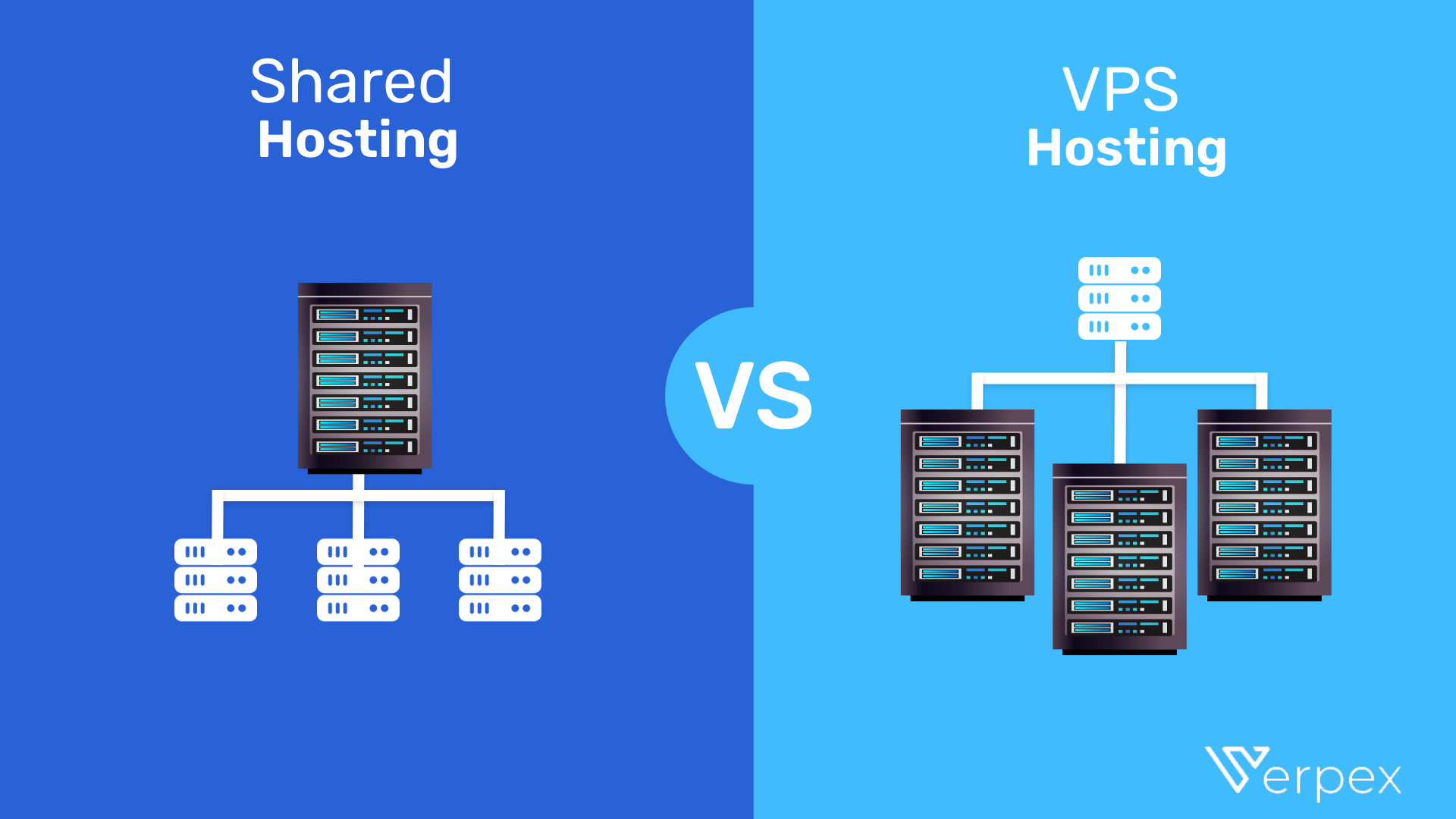
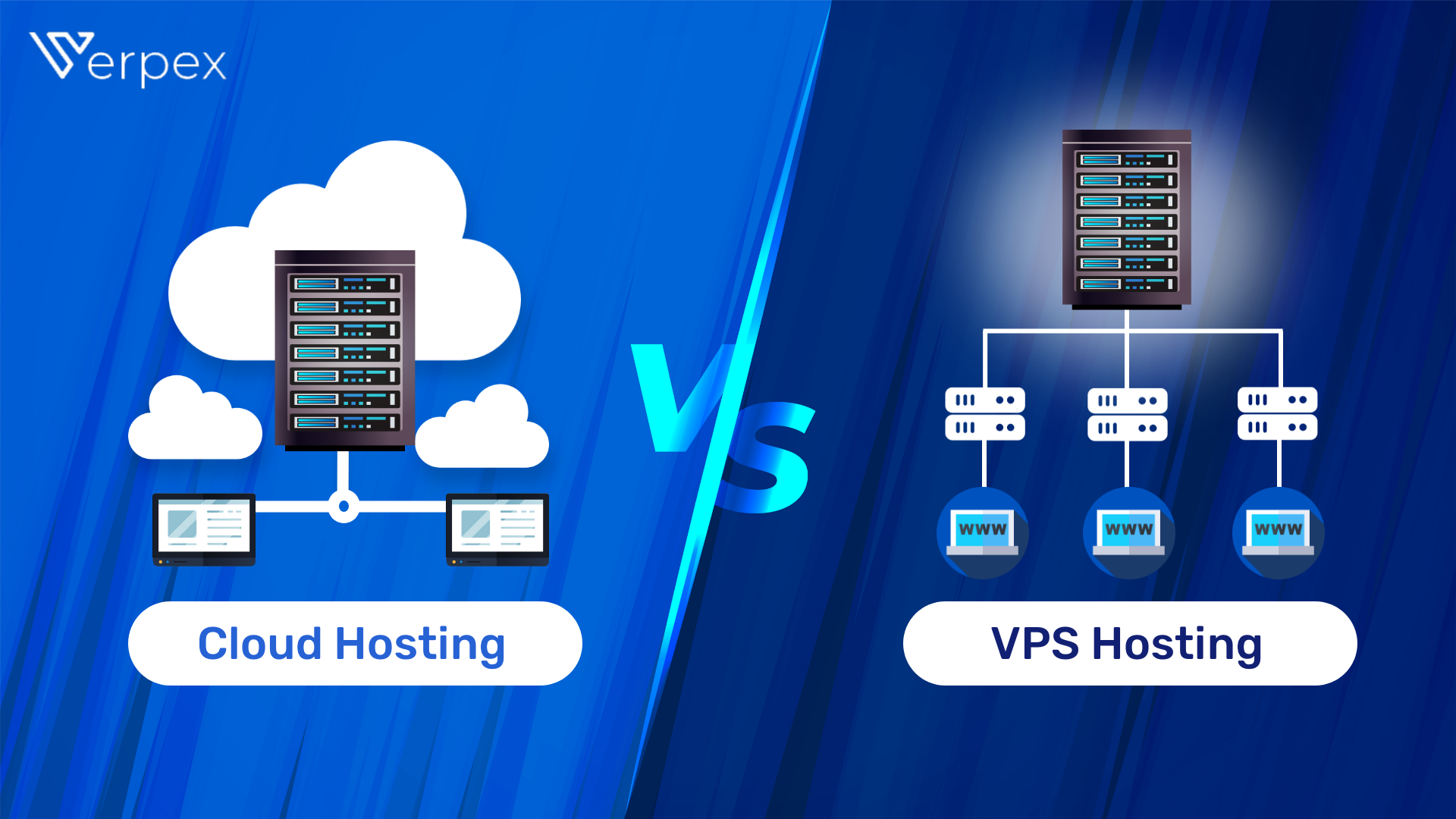
Cloud Hosting Vs. VPS
Cloud hosting is great for websites that need fast scalability and have a fluctuating number of site visitors. VPS options are generally more powerful, and offer a greater degree of control and customization.
Dedicated Server Vs. VPS
Dedicated servers are the ultimate in processing power and are generally reserved for large corporations that have huge traffic volumes to eCommerce stores. VPS hosting offers similar levels of customization thanks to utilizing similar technology, although there are some differences in processing power.
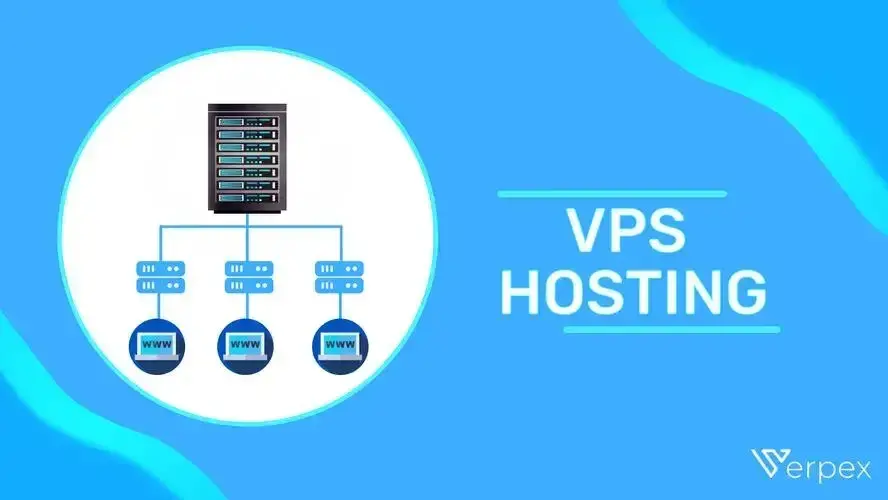
Final Remarks
VPS hosting strikes an excellent balance between affordability, flexibility, customization, bandwidth, and processing power.
It's an ideal choice for medium-sized businesses, popular blogs, or sites with a high number of visitors.
If your needs are simpler, starting with basic shared hosting might be best before upgrading.
For those wanting a hassle-free experience, managed hosting options let the host handle all technical and maintenance tasks.
Explore our Managed Windows VPS Hosting for full support, or take control with our Unmanaged Windows VPS Hosting—both tailored to meet your web hosting needs.
Frequently Asked Questions
Do I need a lot of technical knowledge to use VPS hosting?
Yes, and no. If you choose to carry out a lot of customization you’ll need to be quite experienced. However, there are a lot of managed VPS options that will take care of this for you.
How long will It take to upgrade from shared hosting to VPS?
Usually not long at all. The process is fairly straightforward and our service agents can have you switched over in no time.
Can I install custom software on my VPS server?
In some cases, yes, but you’ll find you might be limited by the operating system you choose.
Is a VPS a VPN?
No, a VPS (Virtual Private Server) and a VPN (Virtual Private Network) are not the same.
A VPS is a virtual server for hosting websites or applications, while a VPN is a secure connection for private internet access.
They serve different purposes and are used in different contexts.
Can you run a website off a VPS?
Yes, you can run a website on a VPS. It provides dedicated resources, control, and flexibility, making it suitable for hosting websites of various sizes.
Does a VPS use your IP?
Unlike shared hosting, which shares an IP among many websites, a VPS provides you with a unique IP address.

I've been navigating the web hosting waters for years now. As the Chief Editor at Verpex, I team up with some awesome writers to dish out the good stuff on hosting. Got a Master's in Journalism, so I always have an eye out for quality. Whether you're just dipping your toes or you're a seasoned surfer, I'm here to make everything web hosting feel like a breeze
View all posts by Julia Lozanov















